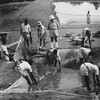Pisciculture in the Belgian Congo
Sustainable Development Avant la Lettre?
DOI:
https://doi.org/10.51769/bmgn-lchr.11689Abstract
After the Second World War, an ambitious fish farming project was set up in the Congo by the Belgian colonial government on the basis of scientific reports indicating the state of fish resources. The aim was to feed the indigenous population, especially in rural areas considered to be the poorest, and to make economic production profitable, which could contribute to the well-being of the Congolese workers. By placing this project in the long history of sustainability, this article presents the main economic and socio-environmental issues regarding food and the use of fish resources that drove this project, as well as the measures put in place by the authorities associated with the experts to respond to them. The last part provides and discusses arguments that allow for the evaluation of the extent to which the fish farming project met the conditions of interconnected economic, social and environmental sustainability, as defined by the concept of sustainable development.
Na de Tweede Wereldoorlog ontwikkelde de Belgische koloniale overheid in Congo een ambitieus viskweekproject op basis van wetenschappelijke rapporten over het welzijn van de visbestanden. Het doel was de lokale bevolking van met name de arme plattelandsgebieden te voeden, de economie rendabel te maken en het welzijn van de Congolese arbeiders te verhogen. Door dit project in de lange geschiedenis van duurzaamheid te plaatsen, presenteert dit artikel de belangrijkste economische, sociale en ecologische problemen die aan de basis van dit project lagen en de maatregelen die experts en autoriteiten hiervoor voorstelden en namen. In de laatste paragraaf wordt beoordeeld in welke mate het viskweekproject voldeed aan het ideaal van duurzame ontwikkeling, waarbinnen economische, sociale en ecologische dimensies van duurzaamheid als onderling samenhangend worden gedefinieerd.
Downloads

Published
Issue
Section
License
Copyright (c) 2022 Patricia Van Schuylenbergh

This work is licensed under a Creative Commons Attribution 4.0 International License.
Authors who publish with this journal agree to the following terms:
a) Authors retain copyright and grant the journal right of first publication with the work simultaneously licensed under a Creative Commons Attribution 4.0 International (CC BY 4.0) that allows others to share the work with an acknowledgement of the work's authorship and initial publication in this journal.
b) Authors are able to enter into separate, additional contractual arrangements for the non-exclusive distribution of the journal's published version of the work (e.g., post it to an institutional repository or publish it in a book), with an acknowledgement of its initial publication in this journal.
c) Authors are permitted to post their work online (e.g., in institutional repositories or on their website) prior to and during the submission process.
Authors are explicitly encouraged to deposit their published article in their institutional repository.








